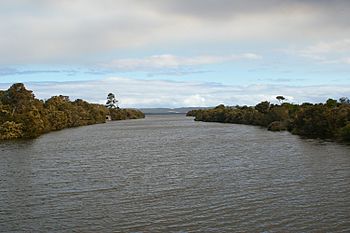Hay River (Western Australia) facts for kids
Quick facts for kids Hay River |
|
|---|---|

Hay River flowing into Wilson Inlet
|
|
| Country | Australia |
| Physical characteristics | |
| Main source | West of Mount Barker 225 metres (738 ft) |
| River mouth | Wilson Inlet sea level |
| Length | 80 kilometres (50 mi) |
| Basin features | |
| Basin size | 129,800 hectares (320,743 acres) |
The Hay River is a river located in the Great Southern part of Western Australia. The Noongar people are the original inhabitants of this land. They have lived here for thousands of years. They call the river Genulup.
Contents
Discovering the Hay River
The Hay River got its English name in December 1829. A naval surgeon named Thomas Braidwood Wilson named it. He chose the name to honor Sir Robert William Hay. Sir Robert was a very important government official in charge of the colonies.
Wilson discovered the river while exploring the area. He was with a local Noongar man named Mokare. They also had John Kent, two convicts, and a soldier with them. Wilson's ship, the Governor Phillip, was being fixed nearby.
Where the Hay River Flows
The Hay River is part of a larger water system. This system includes the Denmark area. It also connects to Wilson Inlet, Torbay Inlet, and Lake Powell. Other rivers like the Denmark and Sleeman-Cuppup also flow into this system.
The river starts west of Mount Barker. It begins near a place called Wilpuna Park. From there, it flows southeast towards Ungerup. Then, it turns and flows southwest. It passes through the beautiful Mount Lindesay National Park. Finally, it crosses the South Coast Highway and flows into Wilson Inlet.
River Characteristics
The Hay River flows all year round. The water quality changes a bit. It can be slightly salty or a little bit brackish. Brackish water is a mix of fresh and salt water.
The river's water level is affected by the tide for about 5 kilometers (3 miles) upstream. This means the ocean's tides push water up the river.
About 70% of the land around the river has been cleared. This land is now used for farming. However, nearly half of the riverbanks are still natural and untouched.
River Tributaries
The Hay River has smaller streams that flow into it. These are called tributaries. Two of its main tributaries are Sleeman Creek and Mitchell River.

